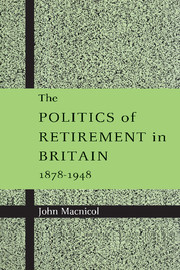Book contents
- Frontmatter
- Contents
- List of tables
- Acknowledgements
- Part I The campaign for old age pensions
- 1 Introduction
- 2 The nineteenth-century background
- 3 Blackley, Chamberlain and Booth
- 4 The opposition of the Charity Organisation Society
- 5 The attitude of the friendly societies
- 6 The labour movement and the state
- Part II Contributory pensions
- Part III The debate on retirement pensions
- Part IV The ‘Beveridge revolution’
- Index
2 - The nineteenth-century background
Published online by Cambridge University Press: 01 October 2009
- Frontmatter
- Contents
- List of tables
- Acknowledgements
- Part I The campaign for old age pensions
- 1 Introduction
- 2 The nineteenth-century background
- 3 Blackley, Chamberlain and Booth
- 4 The opposition of the Charity Organisation Society
- 5 The attitude of the friendly societies
- 6 The labour movement and the state
- Part II Contributory pensions
- Part III The debate on retirement pensions
- Part IV The ‘Beveridge revolution’
- Index
Summary
In the last quarter of the nineteenth century, the British economy underwent profound structural changes. Broadly speaking, the process of industrialisation moved to a ‘late’, ‘advanced’ or ‘mature’ stage, marked by an increasingly technological and less labour-intensive mode of production. The social changes brought about by this economic transition were extremely complex, nuanced and reactive upon each other, and can only be quickly summarised here. Unprecedented improvements in transportation systems (such as the steamship and the motor vehicle) began the process now termed ‘globalisation’, throwing British firms open to the chill winds of international economic competition; associated with this was a new concern with the health and productivity of the individual worker as a unit of labour, in turn giving rise to a social debate on poverty and national fitness. In an increasingly competitive society, men and women had greater incentives to control their own fertility, bringing about a steady fall in the birth-rate; demographers thus view the late nineteenth century as heralding a new phase of the demographic transition. A ‘women's movement’ emerged, first to campaign for the vote but then to address wider issues of legal, social and economic inequality between the sexes. In 1884 there was passed a third Reform Act which, to prescient observers, made mass democracy a future inevitability: as a result, there developed a ‘new politics’ in which the vote of the working class was courted through social reform proposals. Socialism emerged as a viable political ideology; though the British working class remained for a long time deferential and conservative, the appearance of a Marxism-influenced socialism in the 1880s offered a much harder-edged economic critique of capitalism and permanently changed the political culture.
- Type
- Chapter
- Information
- The Politics of Retirement in Britain, 1878–1948 , pp. 18 - 59Publisher: Cambridge University PressPrint publication year: 1998



